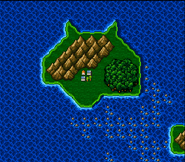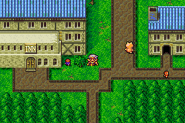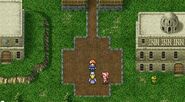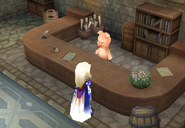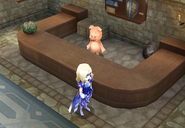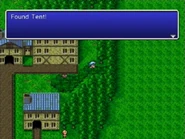Mythril also known as Silvera, Village of Mithril or Mythril Village, is a remote town in Final Fantasy IV and Final Fantasy IV: The After Years situated north of Mount Ordeals.
Mythril is inhabited by Toads, Pigs, and Small People, who mine mythril from an unknown mine. Toads refine the mythril and small people process it and the pigs forge weapons out of the refined mythril. The Adamant Isle Grotto lies east of the city, and can only be accessed with a Hovercraft. No notable events occur here in the original game.
Mythril is the residence of the NPCs known as the Mythril Brothers. The trio consist of a toad, pig and a mini person. They offer to dance for the party.
Story[]
Final Fantasy IV: The After Years[]
Ceodore Harvey comes to the island for his Proof of Knighthood with the Red Wings. He spends the night there and he later goes to the Adamant Isle Grotto with Biggs and Wedge.
Items[]
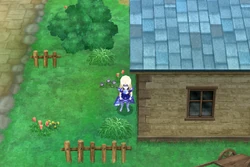
Mythril (3D).
Final Fantasy IV[]
- 2D versions
- 5,000 accumulated gil
- Mythril Dagger
- Mythril Staff
- Diet Ration
- Maiden's Kiss
- 3D versions
- 5000 gil
- Diet Ration
- Maiden's Kiss
- Mythril Knife
- Mythril Staff
Final Fantasy IV: The After Years[]
Shops[]
Final Fantasy IV[]
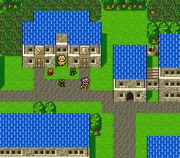
Silvera (SNES).
| 500 gil/night |
| Item | Price | ||
|---|---|---|---|
| SNES | GBA | DS/iOS | |
| Diet Ration | N/A | 100 gil | 100 gil |
| Maiden's Kiss | N/A | 60 gil | 60 gil |
| Mallet | N/A | 80 gil | 80 gil |
| Bomb Crank | N/A | N/A | 1,200 gil |
| Arctic Wind | N/A | N/A | 1,200 gil |
| Heavenly Wrath | N/A | N/A | 1,200 gil |
| Weapon | Price | ||
|---|---|---|---|
| SNES | GBA | DS/iOS | |
| Mythril Knife | 3,000 GP | 3,000 gil | 3,000 gil |
| Mythril Sword | 6,000 GP | 6,000 gil | 6,000 gil |
| Mythril Staff | 4,000 GP | 4,000 gil | 4,000 gil |
| Mythril Hammer | 8,000 GP | 8,000 gil | 8,000 gil |
| Armor | Price | ||
|---|---|---|---|
| SNES | GBA | DS/iOS | |
| Mythril Shield | 1,000 GP | 1,000 gil | 1,000 gil |
| Mythril Helmet | 3,000 GP | 3,000 gil | 3,000 gil |
| Mythril Armor | 17,000 GP | 17,000 gil | 17,000 gil |
| Mythril Gloves | 2,000 GP | 2,000 gil | 2,000 gil |
Final Fantasy IV: The After Years[]
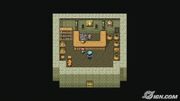
Item shop of Mythril in The After Years.
| 50 gil/night |
Ceodore's Tale[]
| Item | Price |
|---|---|
| Potion | 30 gil |
| Phoenix Down | 100 gil |
| Golden Needle | 400 gil |
| Maiden's Kiss | 60 gil |
| Eye Drops | 30 gil |
| Antidote | 40 gil |
| Tent | 100 gil |
| Gnomish Bread*3D only | 100 gil |
| Armor | Price |
|---|---|
| Bronze Shield | 100 gil |
| Bronze Helm | 150 gil |
| Bronze Armor | 600 gil |
| Weapon | Price |
|---|---|
| Broadsword | 200 gil |
| Longsword | 450 gil |
The Crystals[]
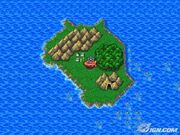
Mythril on the World in The After Years.
| Item | Price |
|---|---|
| Hi-Potion | 150 gil |
| Phoenix Down | 100 gil |
| Maiden's Kiss | 60 gil |
| Mallet | 80 gil |
| Diet Ration | 100 gil |
| Cross | 100 gil |
| Cottage | 500 gil |
| Gnomish Bread | 100 gil |
| Weapon | Price |
|---|---|
| Mythril Sword | 6000 gil |
| Mythril Knife | 3000 gil |
| Mythril Staff | 4000 gil |
| Mythril Hammer | 8000 gil |
| Armor | Price |
|---|---|
| Mythril Armor | 17000 gil |
| Mythril Shield | 1000 gil |
| Mythril Helm | 3000 gil |
| Mythril Gloves | 2000 gil |
Enemies[]
Final Fantasy IV[]
Outside[]
- Cait Sith, Hell Needle x3
- Hell Needle x3, Treant x2
- Twin Snake, Hell Needle x2
- Death Flower, Treant x2
Final Fantasy IV: The After Years[]
- Ceodore's Tale
- Outside
- Floating Eye, Helldiver x2
- Floating Eye x2
- Goblin x2, Sword Rat x2
- Goblin x3
- Goblin x3, Sword Rat
- Goblin x4
- Helldiver x3
- Cave
- The Crystals
- Coeurl x2
- Ironback x2
- Black Lizard x3
- Ironback x2, Black Lizard x2
- White Mousse x4
- Ironback, Armadillo, Black Lizard
- Flamehound x2
- Rukh, Fledgling Rukh
Musical themes[]
The background music that plays in Mythril is the Final Fantasy IV town theme, "Welcome to Our Town!"
Behind the scenes[]
The shape of the island the town is situated on bears a vague resemblance to a pig's head. This detail is lost in 3D versions.
The DS version has a "bug" related to this town: the unusual size of its inhabitants makes talking to the shopkeepers nearly impossible, as one must perfectly line up with them on the angled separator, which pushes the player to either side if they try to orient themselves. This bug was fixed in the iOS version.
Gallery[]
Etymology[]
The word "mythril" or "mithril" is a metal found in many fantasy worlds. It was originally introduced by the fantasy writings of J. R. R. Tolkien, being present in his Middle-earth. It resembles silver but is stronger than steel, and much lighter in weight than either. The author first wrote of it in The Lord of the Rings, and it is retrospectively mentioned in the third, revised edition of The Hobbit in 1966. In the first 1937 edition, the mail shirt given to Bilbo is described as being made of "silvered steel". The name mithril comes from two words in Sindarin—mith, meaning "grey" or "mist", and ril meaning "glitter".

